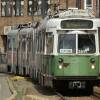An electrical problem caused an MBTA commuter rail train to stall west of Boston Landing Station during the evening rush Monday, leaving passengers aboard the Framingham-bound train stranded for two hours. Another train was brought in to tow the disabled train to Boston Landing. The train was one of 40 due for an overhaul starting next year.
The MBTA admitted it was frustrating for passengers, but said due to the train’s stopped location, it determined that the safest option was for passengers to remain on board.
In a video tweeted from the scene, nearby residents could be seen offering ladders to the departing passengers to help them get over a fence to gain access to a nearby street. Chrissy Brown, one of the passengers stuck on the train for almost two hours, told GBH Morning Edition host Jeremy Siegel that it was an uncomfortable experience.
“There was no AC, no lights. People were sweating. People were escaping,” she said, noting that there was no explanation for what was happening. “They didn't know what the problem was. The engineer couldn't fix it ... No explanation, really. I don't think they knew — no solution.”
Some passengers on @MBTA_CR train forced open doors to get out & climbed the fence with a little help from neighbors. The Framingham Line train has been stopped for more than an hour with no power. pic.twitter.com/Vp7uSsZR4i
— Leo Ruiz (@ProducerLeo) August 1, 2022
When she started to smell smoke, Brown said, “there was a moment I panicked, you know, legitimately panicked and did not feel safe. I had been on a Green Line train before we started smoking and we had to get off. … I understand, it's not lost on me, that this is the oldest public transportation in the country. Guess what? It shows. It's awful.”
Brown told Siegel that she did not receive any explanation or apology from the T. As a regular T rider, she says she often factors in delays to her commute, and says that T riders are frustrated.
“There’s no transparency, there's no accountability. It's completely inept,” she said, and Monday’s incident was too much. “And I wouldn't complain generally, but I'd absolutely had it.”
The MBTA is in the process of refurbishing all diesel-powered locomotives in the commuter rail fleet. Spokesperson Joe Pesaturo says the 10 engines that have been rebuilt and returned to service are the most reliable in the fleet, but it will take several years to fully restore the others.








